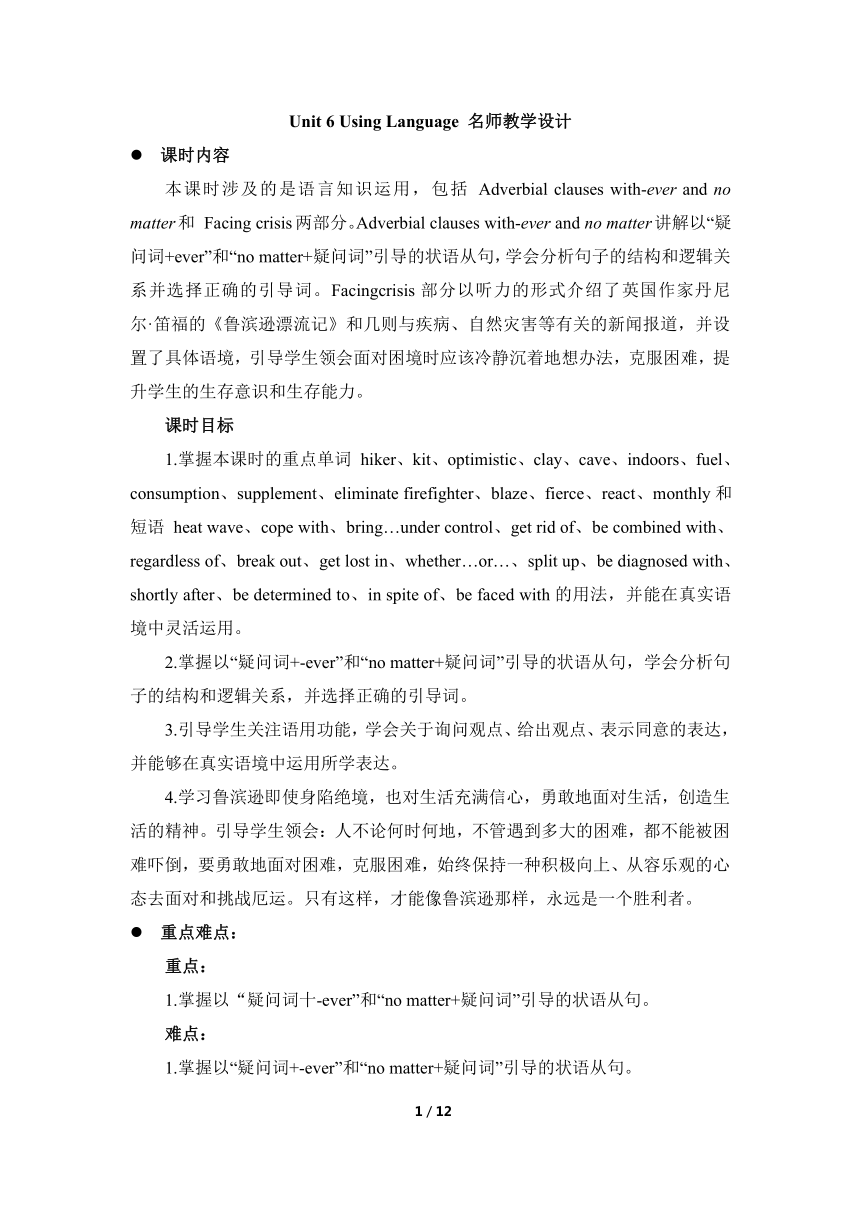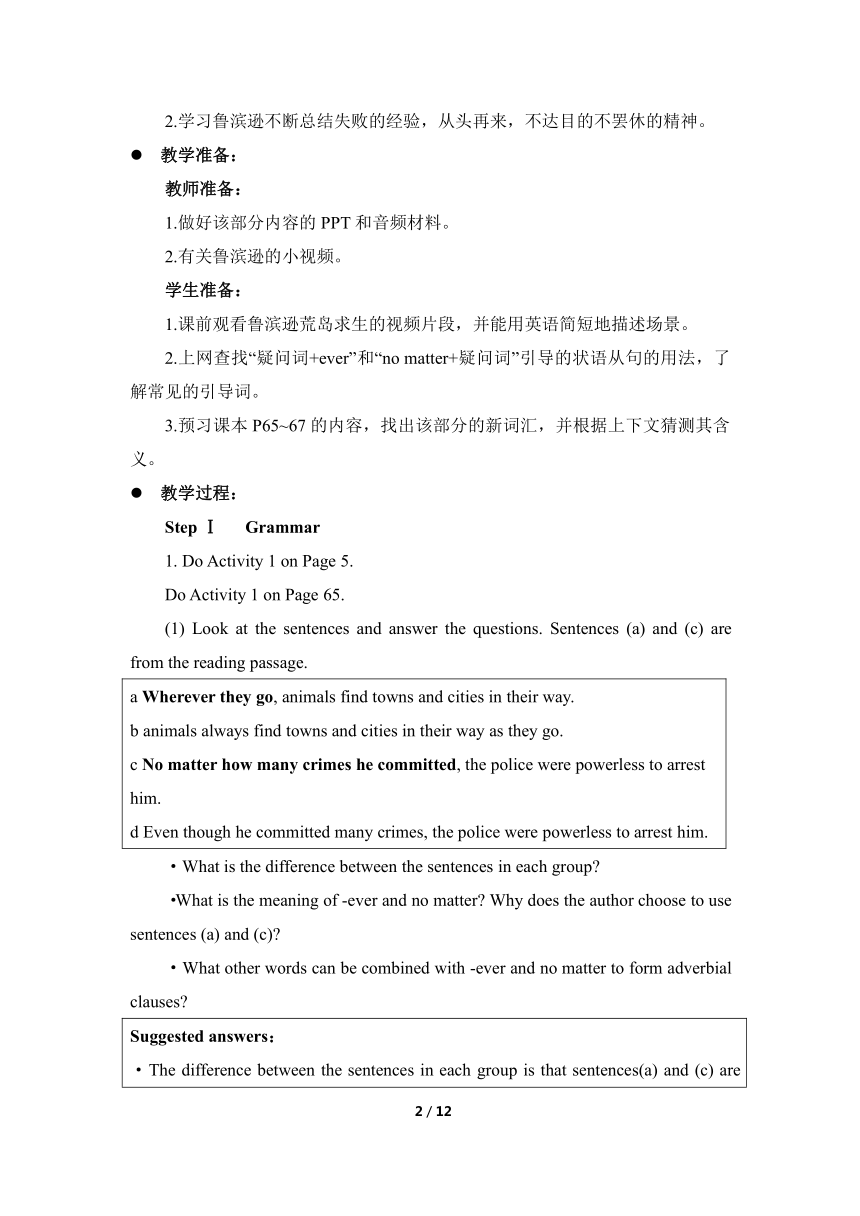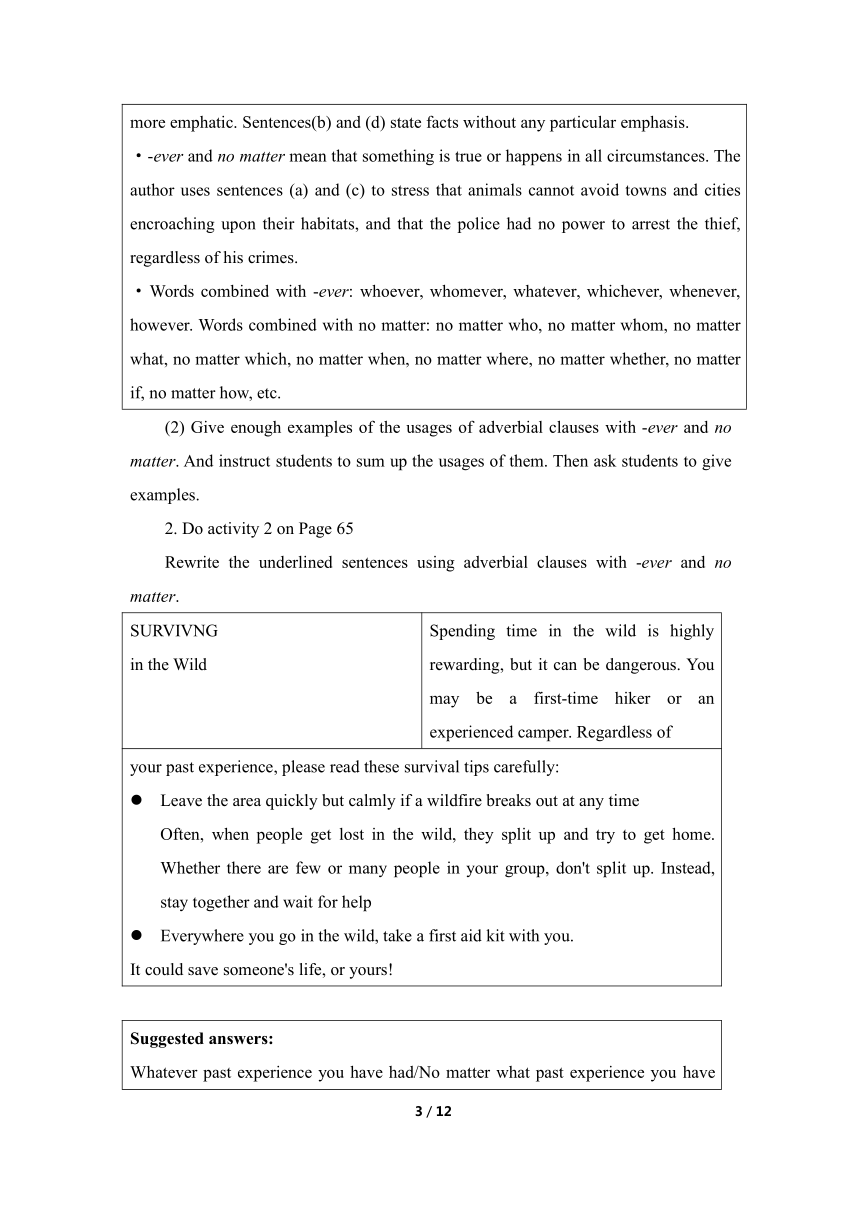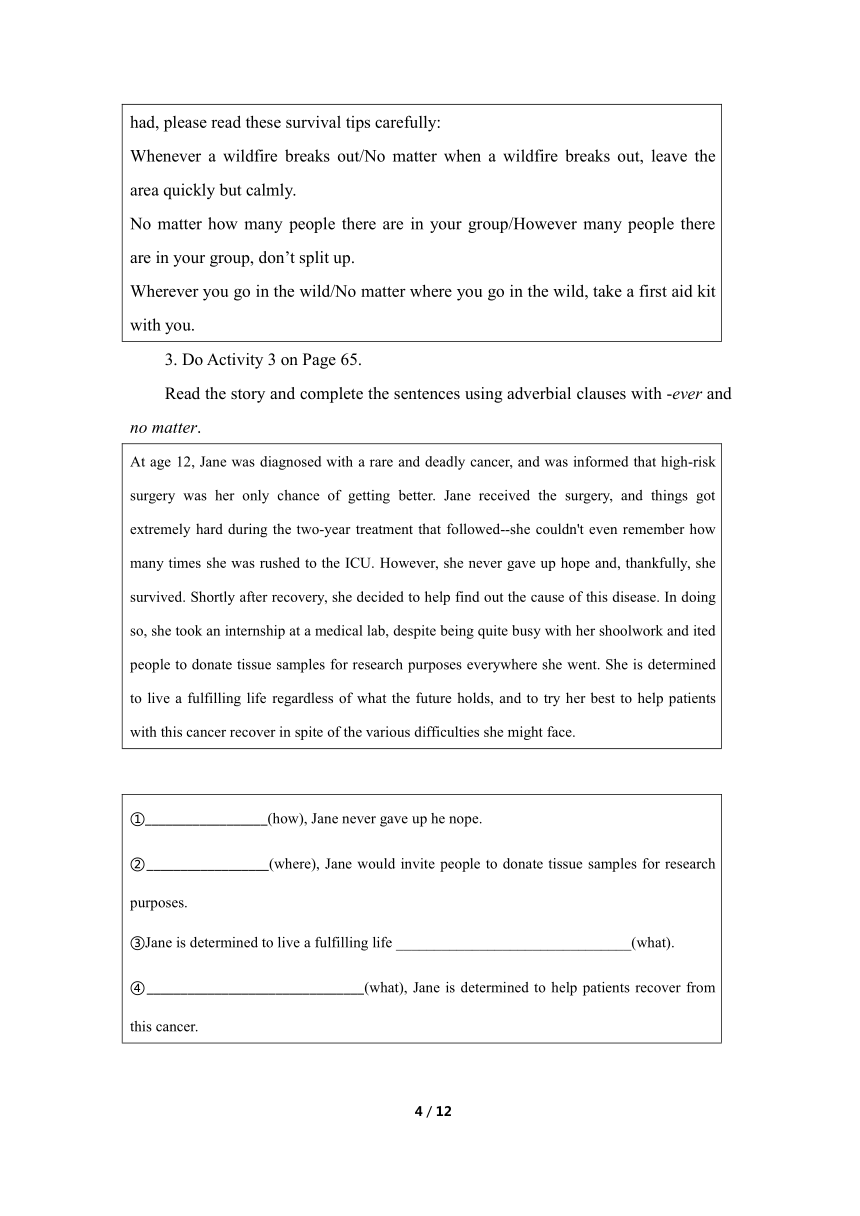外研版(2019) 选择性必修第二册 Unit6 Survival Using Language 名师教学设计
文档属性
| 名称 | 外研版(2019) 选择性必修第二册 Unit6 Survival Using Language 名师教学设计 |

|
|
| 格式 | docx | ||
| 文件大小 | 2.7MB | ||
| 资源类型 | 教案 | ||
| 版本资源 | 外研版(2019) | ||
| 科目 | 英语 | ||
| 更新时间 | 2023-03-04 18:31:24 | ||
图片预览





文档简介
Unit 6 Using Language 名师教学设计
课时内容
本课时涉及的是语言知识运用,包括 Adverbial clauses with-ever and no matter和 Facing crisis两部分。Adverbial clauses with-ever and no matter讲解以“疑问词+ever”和“no matter+疑问词”引导的状语从句,学会分析句子的结构和逻辑关系并选择正确的引导词。Facingcrisis部分以听力的形式介绍了英国作家丹尼尔·笛福的《鲁滨逊漂流记》和几则与疾病、自然灾害等有关的新闻报道,并设置了具体语境,引导学生领会面对困境时应该冷静沉着地想办法,克服困难,提升学生的生存意识和生存能力。
课时目标
1.掌握本课时的重点单词 hiker、kit、optimistic、clay、cave、indoors、fuel、consumption、supplement、eliminate firefighter、blaze、fierce、react、monthly和短语 heat wave、cope with、bring…under control、get rid of、be combined with、regardless of、break out、get lost in、whether…or…、split up、be diagnosed with、shortly after、be determined to、in spite of、be faced with的用法,并能在真实语境中灵活运用。
2.掌握以“疑问词+-ever”和“no matter+疑问词”引导的状语从句,学会分析句子的结构和逻辑关系,并选择正确的引导词。
3.引导学生关注语用功能,学会关于询问观点、给出观点、表示同意的表达,并能够在真实语境中运用所学表达。
4.学习鲁滨逊即使身陷绝境,也对生活充满信心,勇敢地面对生活,创造生活的精神。引导学生领会:人不论何时何地,不管遇到多大的困难,都不能被困难吓倒,要勇敢地面对困难,克服困难,始终保持一种积极向上、从容乐观的心态去面对和挑战厄运。只有这样,才能像鲁滨逊那样,永远是一个胜利者。
重点难点:
重点:
1.掌握以“疑问词十-ever”和“no matter+疑问词”引导的状语从句。
难点:
1.掌握以“疑问词+-ever”和“no matter+疑问词”引导的状语从句。
2.学习鲁滨逊不断总结失败的经验,从头再来,不达目的不罢休的精神。
教学准备:
教师准备:
1.做好该部分内容的PPT和音频材料。
2.有关鲁滨逊的小视频。
学生准备:
1.课前观看鲁滨逊荒岛求生的视频片段,并能用英语简短地描述场景。
2.上网查找“疑问词+ever”和“no matter+疑问词”引导的状语从句的用法,了解常见的引导词。
3.预习课本P65~67的内容,找出该部分的新词汇,并根据上下文猜测其含义。
教学过程:
Step Ⅰ Grammar
1. Do Activity 1 on Page 5.
Do Activity 1 on Page 65.
(1) Look at the sentences and answer the questions. Sentences (a) and (c) are from the reading passage.
a Wherever they go, animals find towns and cities in their way. b animals always find towns and cities in their way as they go. c No matter how many crimes he committed, the police were powerless to arrest him. d Even though he committed many crimes, the police were powerless to arrest him.
·What is the difference between the sentences in each group
·What is the meaning of -ever and no matter Why does the author choose to use sentences (a) and (c)
·What other words can be combined with -ever and no matter to form adverbial clauses
Suggested answers: ·The difference between the sentences in each group is that sentences(a) and (c) are more emphatic. Sentences(b) and (d) state facts without any particular emphasis. ·-ever and no matter mean that something is true or happens in all circumstances. The author uses sentences (a) and (c) to stress that animals cannot avoid towns and cities encroaching upon their habitats, and that the police had no power to arrest the thief, regardless of his crimes. ·Words combined with -ever: whoever, whomever, whatever, whichever, whenever, however. Words combined with no matter: no matter who, no matter whom, no matter what, no matter which, no matter when, no matter where, no matter whether, no matter if, no matter how, etc.
(2) Give enough examples of the usages of adverbial clauses with -ever and no matter. And instruct students to sum up the usages of them. Then ask students to give examples.
2. Do activity 2 on Page 65
Rewrite the underlined sentences using adverbial clauses with -ever and no matter.
SURVIVNG in the Wild Spending time in the wild is highly rewarding, but it can be dangerous. You may be a first-time hiker or an experienced camper. Regardless of
your past experience, please read these survival tips carefully: Leave the area quickly but calmly if a wildfire breaks out at any time Often, when people get lost in the wild, they split up and try to get home. Whether there are few or many people in your group, don't split up. Instead, stay together and wait for help Everywhere you go in the wild, take a first aid kit with you. It could save someone's life, or yours!
Suggested answers: Whatever past experience you have had/No matter what past experience you have had, please read these survival tips carefully: Whenever a wildfire breaks out/No matter when a wildfire breaks out, leave the area quickly but calmly. No matter how many people there are in your group/However many people there are in your group, don’t split up. Wherever you go in the wild/No matter where you go in the wild, take a first aid kit with you.
3. Do Activity 3 on Page 65.
Read the story and complete the sentences using adverbial clauses with -ever and no matter.
At age 12, Jane was diagnosed with a rare and deadly cancer, and was informed that high-risk surgery was her only chance of getting better. Jane received the surgery, and things got extremely hard during the two-year treatment that followed--she couldn't even remember how many times she was rushed to the ICU. However, she never gave up hope and, thankfully, she survived. Shortly after recovery, she decided to help find out the cause of this disease. In doing so, she took an internship at a medical lab, despite being quite busy with her shoolwork and ited people to donate tissue samples for research purposes everywhere she went. She is determined to live a fulfilling life regardless of what the future holds, and to try her best to help patients with this cancer recover in spite of the various difficulties she might face.
①__________________(how), Jane never gave up he nope. ②__________________(where), Jane would invite people to donate tissue samples for research purposes. ③Jane is determined to live a fulfilling life _______________________________(what). ④________________________________(what), Jane is determined to help patients recover from this cancer.
Suggested answers: ①No matter how many times she was rushed to the ICU/However many times she was rushed to the ICU, Jane never gave up hope. ②Wherever she went/No matter where she went Jane would invite people to donate tissue samples for research purposes. ③Jane is determined to live a fulfilling life no matter what the future holds/whatever the future holds. ④No matter what difficulties she might face/Whatever difficulties she might face, Jane is determined to help patients recover from this cancer.
4. Do Activity 4 on Page 65.
Think of another survival story and tell the class about it using adverbial clauses with -ever and no matter. Do online research if necessary.
【设计意图】通过学生熟知的语境,感知、体会让步状语从句的用法,在此基础上,利用句型转换、补全句子的形式进一步掌握让步状语从句的具体运用。通过讲述的形式,达到在真实语境中进行让步状语从句的灵活运用,提高分析问题、解决问题的能力。
【备注】语法知识点讲解详见第二教案“重点语法精讲”。
Step Ⅱ Facing crisis
1. Do Activity 5 on Page 66.
Listen to the conversation and choose the ideas NOT conveyed by the speakers.
①he story of Robinson Crusoe is a very sad survival story. ②It takes great patience for Robinson Crusoe to survive on the island. ③Robinson Crusoe is a clever and optimistic man. ④Robinson Crusoe's words are good suggestions when we are faced with a crisis. ⑤The most important reason for Robinson Crusoes survival is his calmness.
Suggested answers:
(2) Do Activity 6 on Page 66.
(1) Listen again and complete the diagram.
Suggested answers: ①lose his head ②gets necessary things ③Lives in a cave ④builds a fence ⑤makes a fire ⑥out of wood ⑦Sewing animal skins together ⑧knowledgeable ⑨widen and deepen his cave ⑩ruined by a landslide/a fall of earth 11feel depressed redoes the work, using wooden posts to make the cave stronger than before looks more upon the bright side of his condition and less upon the dark side positive attitude
(2)Talk about the qualities that help Robinson Crusoe to survive. Do further research if necessary.
【设计意图】针对听力设置了两个相应的练习题,第次听录音,选择文章未传递的信息;第二次听录音,难度有所增加,要求听的同时补充故事的内容,写出关键信息。听完录音后,先处理这两个练习题,在语言输入的基础上进行语言输出,再让学生自己创设语境进行讨论,提高语言的运用能力。
3.Do Activity 7 on Page 66.
Complete the boxes with the expressions from the conversation
Asking for opinions
Giving opinions
Agreeing
Suggested answers: Asking for opinions What do you think… What's your take on this Giving opinions The way I see it, … Personally, I think/believe… I'm quite impressed… What surprises me more is … Agreeing I can't agree more. I think you are right. I think so, too. That's true.
【设计意图】通过列举、总结和归纳英文表达的方式,引导学生关注与话题相关表达的语用功能。
4.Do Activity 8 on Page 66
Read the passage and answer the questions.
Daniel Defoe was an English writer, who is best known for his novel Robinson Crusoe,although he also wrote hundreds of other works. He published Robinson Crusoe in 1719 at the age of 59. Today, it remains one of the most famous tales of survival ever told. Countless readers have been encouraged by Robinson Crusoe's qualities, which go beyond his survival on a desert island. Such qualities can help us cope in a crisis, no matter what or where it is.
·What kinds of crises do you know people are facing in different parts of the world?
·What can we do when facing such crises?
【设计意图】通过了解《鲁滨逊漂流记》的作者 Daniel Defoe,引导学生学习 Robinson crusoe面对困难时积极乐观、勇于克服困难的精神,同时引导学生思考世界各地有哪些不同的危机以及如何应对这些危机。
5.Do activity 9 on Page 67.
Read the newspaper reports and answer the questions. Pay attention to the words and expressions in bold.
·What situations are mentioned in the headlines?
·How do people and organisations react to these crises?
Suggested answers: ·The first one tells of an outbreak of a new disease. The second one reports a heat wave. The third one tells of an oil shortage. The fourth one reports the invasion of foreign species on an island. The fifth one tells of the spreading of a huge fire. ·□Doctors are flying there and will be testing various medicines to find a cure. □Countries which are hit by a heat wave advise people to stay indoors and avoid exercise. Some people go to swimming pools and beaches to cool themselves down. □The President has announced measures to limit fuel consumption and scientists are finding new measures and fuel sources. □Scientists are carrying out a three-year programme to eliminate the introduced species. □Firefighters brought the huge fire under control after battling for hours.
6. Do Activity 10 on Page 67.
Read the advertisement and rewrite the underlined expressions with the correct form of the words and expressions in Activity 9.
Suggested answers: ①battling ②cope with ③struggle with ④eliminate ⑤bring our problems under control
【设计意图】阅读新闻报道,注意黑体词的用法,并在不同语境中灵活运用黑体词汇,达到知识运用、知识迁移的目的。
7.Do Activity 11 on Page 67.
Work in pairs. Think of another issue concerning survival and talk about how to deal with it. Use the words and expressions in this section.
【设计意图】使用语言提示,想出另一个关于生存危机的情景,并就该危机及其应对措施开展对话,进一步提高学生的语言表达和运用能力。
Step Ⅲ Summing up
总结“疑问词+-ever”和“no matter+疑问词”引导的状语从句的结构和逻辑关系,并注意该部分新学词汇的运用。
Step IV Homework
总结非限制性定语从句的含义和用法,并注意该部分新词汇的运用。
Step V
1. Give students some examples to fill in the blanks with adverbial clauses with -ever and no matter.
2. Master the usages of the new vocabulary.
板书设计:
Unit 6 Survial Period II Using language I .Grammar 1. Do Activity 1 on Page 65. (1) Look at the sentences and answer the questions. (2) Give enough examples of the usages of adverbial clauses with -ever and no matter. 2. Do Activity 2 on Page 65. Rewrite the underlined sentences using adverbial clauses with -ever and no matter. 3. Do activity 3 on Page 65. Read the story and complete the sentences using adverbial clauses with -ever and no matter. 4. Do Activity 4 on Page 65. Think of another survival story and tell the class about it using adverbial clauses with -ever and no matter. Ⅱ. Facing crisis 1. Do activity 5 on Page 66. Listen to the conversation and choose the ideas NOT conveyed by the speakers. 2. Do Activity 6 on Page 66. (1) Listen again and complete the diagram. (2) Talk about the qualities that help Robinson Crusoe to survive. 3. Do Activity 7 on Page plete the boxes with the expressions from the conversation. 4. Do Activity 8 on Page 66. Read the passage and answer the questions. 5. Do activity 9 on Page 67. Read the newspaper reports and answer the question. Pay attention to the words and expressions in bold.. 6. Do Activity 10 on Page 67. Read the advertisement and rewrite the underlined expressions with the correct form of the words and expressions in Activity 9. 7. Do Activity 11 on Page 67. Think of another issue concerning survival and talk about how to deal with it. Use the words and expressions in this section. Ⅲ. Summing up IV. Homework
4 / 4
课时内容
本课时涉及的是语言知识运用,包括 Adverbial clauses with-ever and no matter和 Facing crisis两部分。Adverbial clauses with-ever and no matter讲解以“疑问词+ever”和“no matter+疑问词”引导的状语从句,学会分析句子的结构和逻辑关系并选择正确的引导词。Facingcrisis部分以听力的形式介绍了英国作家丹尼尔·笛福的《鲁滨逊漂流记》和几则与疾病、自然灾害等有关的新闻报道,并设置了具体语境,引导学生领会面对困境时应该冷静沉着地想办法,克服困难,提升学生的生存意识和生存能力。
课时目标
1.掌握本课时的重点单词 hiker、kit、optimistic、clay、cave、indoors、fuel、consumption、supplement、eliminate firefighter、blaze、fierce、react、monthly和短语 heat wave、cope with、bring…under control、get rid of、be combined with、regardless of、break out、get lost in、whether…or…、split up、be diagnosed with、shortly after、be determined to、in spite of、be faced with的用法,并能在真实语境中灵活运用。
2.掌握以“疑问词+-ever”和“no matter+疑问词”引导的状语从句,学会分析句子的结构和逻辑关系,并选择正确的引导词。
3.引导学生关注语用功能,学会关于询问观点、给出观点、表示同意的表达,并能够在真实语境中运用所学表达。
4.学习鲁滨逊即使身陷绝境,也对生活充满信心,勇敢地面对生活,创造生活的精神。引导学生领会:人不论何时何地,不管遇到多大的困难,都不能被困难吓倒,要勇敢地面对困难,克服困难,始终保持一种积极向上、从容乐观的心态去面对和挑战厄运。只有这样,才能像鲁滨逊那样,永远是一个胜利者。
重点难点:
重点:
1.掌握以“疑问词十-ever”和“no matter+疑问词”引导的状语从句。
难点:
1.掌握以“疑问词+-ever”和“no matter+疑问词”引导的状语从句。
2.学习鲁滨逊不断总结失败的经验,从头再来,不达目的不罢休的精神。
教学准备:
教师准备:
1.做好该部分内容的PPT和音频材料。
2.有关鲁滨逊的小视频。
学生准备:
1.课前观看鲁滨逊荒岛求生的视频片段,并能用英语简短地描述场景。
2.上网查找“疑问词+ever”和“no matter+疑问词”引导的状语从句的用法,了解常见的引导词。
3.预习课本P65~67的内容,找出该部分的新词汇,并根据上下文猜测其含义。
教学过程:
Step Ⅰ Grammar
1. Do Activity 1 on Page 5.
Do Activity 1 on Page 65.
(1) Look at the sentences and answer the questions. Sentences (a) and (c) are from the reading passage.
a Wherever they go, animals find towns and cities in their way. b animals always find towns and cities in their way as they go. c No matter how many crimes he committed, the police were powerless to arrest him. d Even though he committed many crimes, the police were powerless to arrest him.
·What is the difference between the sentences in each group
·What is the meaning of -ever and no matter Why does the author choose to use sentences (a) and (c)
·What other words can be combined with -ever and no matter to form adverbial clauses
Suggested answers: ·The difference between the sentences in each group is that sentences(a) and (c) are more emphatic. Sentences(b) and (d) state facts without any particular emphasis. ·-ever and no matter mean that something is true or happens in all circumstances. The author uses sentences (a) and (c) to stress that animals cannot avoid towns and cities encroaching upon their habitats, and that the police had no power to arrest the thief, regardless of his crimes. ·Words combined with -ever: whoever, whomever, whatever, whichever, whenever, however. Words combined with no matter: no matter who, no matter whom, no matter what, no matter which, no matter when, no matter where, no matter whether, no matter if, no matter how, etc.
(2) Give enough examples of the usages of adverbial clauses with -ever and no matter. And instruct students to sum up the usages of them. Then ask students to give examples.
2. Do activity 2 on Page 65
Rewrite the underlined sentences using adverbial clauses with -ever and no matter.
SURVIVNG in the Wild Spending time in the wild is highly rewarding, but it can be dangerous. You may be a first-time hiker or an experienced camper. Regardless of
your past experience, please read these survival tips carefully: Leave the area quickly but calmly if a wildfire breaks out at any time Often, when people get lost in the wild, they split up and try to get home. Whether there are few or many people in your group, don't split up. Instead, stay together and wait for help Everywhere you go in the wild, take a first aid kit with you. It could save someone's life, or yours!
Suggested answers: Whatever past experience you have had/No matter what past experience you have had, please read these survival tips carefully: Whenever a wildfire breaks out/No matter when a wildfire breaks out, leave the area quickly but calmly. No matter how many people there are in your group/However many people there are in your group, don’t split up. Wherever you go in the wild/No matter where you go in the wild, take a first aid kit with you.
3. Do Activity 3 on Page 65.
Read the story and complete the sentences using adverbial clauses with -ever and no matter.
At age 12, Jane was diagnosed with a rare and deadly cancer, and was informed that high-risk surgery was her only chance of getting better. Jane received the surgery, and things got extremely hard during the two-year treatment that followed--she couldn't even remember how many times she was rushed to the ICU. However, she never gave up hope and, thankfully, she survived. Shortly after recovery, she decided to help find out the cause of this disease. In doing so, she took an internship at a medical lab, despite being quite busy with her shoolwork and ited people to donate tissue samples for research purposes everywhere she went. She is determined to live a fulfilling life regardless of what the future holds, and to try her best to help patients with this cancer recover in spite of the various difficulties she might face.
①__________________(how), Jane never gave up he nope. ②__________________(where), Jane would invite people to donate tissue samples for research purposes. ③Jane is determined to live a fulfilling life _______________________________(what). ④________________________________(what), Jane is determined to help patients recover from this cancer.
Suggested answers: ①No matter how many times she was rushed to the ICU/However many times she was rushed to the ICU, Jane never gave up hope. ②Wherever she went/No matter where she went Jane would invite people to donate tissue samples for research purposes. ③Jane is determined to live a fulfilling life no matter what the future holds/whatever the future holds. ④No matter what difficulties she might face/Whatever difficulties she might face, Jane is determined to help patients recover from this cancer.
4. Do Activity 4 on Page 65.
Think of another survival story and tell the class about it using adverbial clauses with -ever and no matter. Do online research if necessary.
【设计意图】通过学生熟知的语境,感知、体会让步状语从句的用法,在此基础上,利用句型转换、补全句子的形式进一步掌握让步状语从句的具体运用。通过讲述的形式,达到在真实语境中进行让步状语从句的灵活运用,提高分析问题、解决问题的能力。
【备注】语法知识点讲解详见第二教案“重点语法精讲”。
Step Ⅱ Facing crisis
1. Do Activity 5 on Page 66.
Listen to the conversation and choose the ideas NOT conveyed by the speakers.
①he story of Robinson Crusoe is a very sad survival story. ②It takes great patience for Robinson Crusoe to survive on the island. ③Robinson Crusoe is a clever and optimistic man. ④Robinson Crusoe's words are good suggestions when we are faced with a crisis. ⑤The most important reason for Robinson Crusoes survival is his calmness.
Suggested answers:
(2) Do Activity 6 on Page 66.
(1) Listen again and complete the diagram.
Suggested answers: ①lose his head ②gets necessary things ③Lives in a cave ④builds a fence ⑤makes a fire ⑥out of wood ⑦Sewing animal skins together ⑧knowledgeable ⑨widen and deepen his cave ⑩ruined by a landslide/a fall of earth 11feel depressed redoes the work, using wooden posts to make the cave stronger than before looks more upon the bright side of his condition and less upon the dark side positive attitude
(2)Talk about the qualities that help Robinson Crusoe to survive. Do further research if necessary.
【设计意图】针对听力设置了两个相应的练习题,第次听录音,选择文章未传递的信息;第二次听录音,难度有所增加,要求听的同时补充故事的内容,写出关键信息。听完录音后,先处理这两个练习题,在语言输入的基础上进行语言输出,再让学生自己创设语境进行讨论,提高语言的运用能力。
3.Do Activity 7 on Page 66.
Complete the boxes with the expressions from the conversation
Asking for opinions
Giving opinions
Agreeing
Suggested answers: Asking for opinions What do you think… What's your take on this Giving opinions The way I see it, … Personally, I think/believe… I'm quite impressed… What surprises me more is … Agreeing I can't agree more. I think you are right. I think so, too. That's true.
【设计意图】通过列举、总结和归纳英文表达的方式,引导学生关注与话题相关表达的语用功能。
4.Do Activity 8 on Page 66
Read the passage and answer the questions.
Daniel Defoe was an English writer, who is best known for his novel Robinson Crusoe,although he also wrote hundreds of other works. He published Robinson Crusoe in 1719 at the age of 59. Today, it remains one of the most famous tales of survival ever told. Countless readers have been encouraged by Robinson Crusoe's qualities, which go beyond his survival on a desert island. Such qualities can help us cope in a crisis, no matter what or where it is.
·What kinds of crises do you know people are facing in different parts of the world?
·What can we do when facing such crises?
【设计意图】通过了解《鲁滨逊漂流记》的作者 Daniel Defoe,引导学生学习 Robinson crusoe面对困难时积极乐观、勇于克服困难的精神,同时引导学生思考世界各地有哪些不同的危机以及如何应对这些危机。
5.Do activity 9 on Page 67.
Read the newspaper reports and answer the questions. Pay attention to the words and expressions in bold.
·What situations are mentioned in the headlines?
·How do people and organisations react to these crises?
Suggested answers: ·The first one tells of an outbreak of a new disease. The second one reports a heat wave. The third one tells of an oil shortage. The fourth one reports the invasion of foreign species on an island. The fifth one tells of the spreading of a huge fire. ·□Doctors are flying there and will be testing various medicines to find a cure. □Countries which are hit by a heat wave advise people to stay indoors and avoid exercise. Some people go to swimming pools and beaches to cool themselves down. □The President has announced measures to limit fuel consumption and scientists are finding new measures and fuel sources. □Scientists are carrying out a three-year programme to eliminate the introduced species. □Firefighters brought the huge fire under control after battling for hours.
6. Do Activity 10 on Page 67.
Read the advertisement and rewrite the underlined expressions with the correct form of the words and expressions in Activity 9.
Suggested answers: ①battling ②cope with ③struggle with ④eliminate ⑤bring our problems under control
【设计意图】阅读新闻报道,注意黑体词的用法,并在不同语境中灵活运用黑体词汇,达到知识运用、知识迁移的目的。
7.Do Activity 11 on Page 67.
Work in pairs. Think of another issue concerning survival and talk about how to deal with it. Use the words and expressions in this section.
【设计意图】使用语言提示,想出另一个关于生存危机的情景,并就该危机及其应对措施开展对话,进一步提高学生的语言表达和运用能力。
Step Ⅲ Summing up
总结“疑问词+-ever”和“no matter+疑问词”引导的状语从句的结构和逻辑关系,并注意该部分新学词汇的运用。
Step IV Homework
总结非限制性定语从句的含义和用法,并注意该部分新词汇的运用。
Step V
1. Give students some examples to fill in the blanks with adverbial clauses with -ever and no matter.
2. Master the usages of the new vocabulary.
板书设计:
Unit 6 Survial Period II Using language I .Grammar 1. Do Activity 1 on Page 65. (1) Look at the sentences and answer the questions. (2) Give enough examples of the usages of adverbial clauses with -ever and no matter. 2. Do Activity 2 on Page 65. Rewrite the underlined sentences using adverbial clauses with -ever and no matter. 3. Do activity 3 on Page 65. Read the story and complete the sentences using adverbial clauses with -ever and no matter. 4. Do Activity 4 on Page 65. Think of another survival story and tell the class about it using adverbial clauses with -ever and no matter. Ⅱ. Facing crisis 1. Do activity 5 on Page 66. Listen to the conversation and choose the ideas NOT conveyed by the speakers. 2. Do Activity 6 on Page 66. (1) Listen again and complete the diagram. (2) Talk about the qualities that help Robinson Crusoe to survive. 3. Do Activity 7 on Page plete the boxes with the expressions from the conversation. 4. Do Activity 8 on Page 66. Read the passage and answer the questions. 5. Do activity 9 on Page 67. Read the newspaper reports and answer the question. Pay attention to the words and expressions in bold.. 6. Do Activity 10 on Page 67. Read the advertisement and rewrite the underlined expressions with the correct form of the words and expressions in Activity 9. 7. Do Activity 11 on Page 67. Think of another issue concerning survival and talk about how to deal with it. Use the words and expressions in this section. Ⅲ. Summing up IV. Homework
4 / 4
